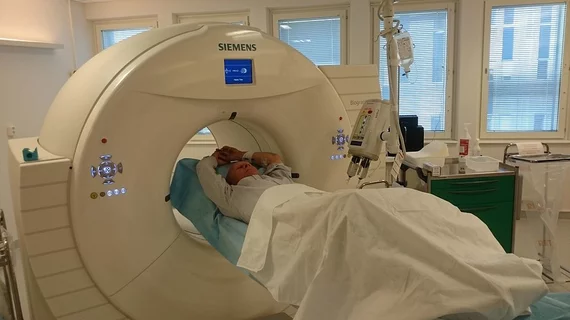Novel radiotracer could improve the diagnosis of interstitial lung disease
A new molecular imaging marker could help identify the progression of interstitial lung disease sooner than before.
Phase 2 of the PRospective Evaluation of Interstitial Lung Disease progression with quantitative CT (PREDICT-ILD) study started this week. One objective of the study is to evaluate 99mTc-maraciclatide as an imaging marker for disease prognostication.
Uptake of the novel molecular SPECT imaging agent will be used to assess differences between patients with idiopathic pulmonary fibrosis (IPF), non-IPF fibrosing-ILD and a group of healthy controls. Researchers also hope to evaluate αvβ3 activity as an indication of disease progression in patients with fibrosing ILD.
One patient has already been scanned using the new agent, but experts plan to include 69 more trial participants.
The study is being conducted by the University of Exeter—an institution renowned for its research on lung diseases. The University is collaborating with clinical radiopharmaceutical company Serac Healthcare Limited, who developed the imaging agent.
"The distinction between ILD conditions which are characterized by scarring and inflammation is crucial as this determines the appropriate treatment,” Chief Executive of Serac Healthcare, David Hail, said in a release on the trial. “A molecular imaging marker with the potential to differentiate between early-stage inflammation and the fibrosis it causes could have a significant impact on improving patient outcomes, as well as the development of new therapies.”
The study’s clinical lead Professor Michael Gibbons, Senior Investigator Fellow at NIHR Exeter Biomedical Research Center, also expressed enthusiasm for how the trial could affect patients with the debilitating condition.
"Being able to detect disease progression sooner and thereby enabling earlier access to disease modifying treatments to appropriate patients would represent a step change in the treatment of this incurable condition,” Gibbons said. “We are excited to be working with Serac Healthcare to evaluate whether maraciclatide could play a part to bring precision medicine to this patient population."
It is estimated that interstitial lung disease affects more than 650,000 people in the United States. The disease, which triggers rampant dyspnea and inevitably progresses to respiratory failure, causes approximately 30,000 deaths in the U.S. every year.
Learn more about the PREDICT-ILD study here.

